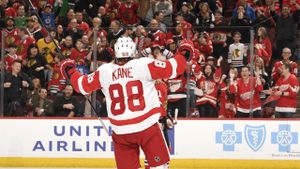With the health of Pope Francis (Jorge Mario Bergoglio) remaining precarious, the global Catholic community is gripped by uncertainty as the pontiff continues to receive treatment at the Gemelli Hospital in Rome. Described as being in "critical" condition, the 88-year-old pope has faced severe respiratory challenges, and the hospital has confirmed he is currently relying on high-flow oxygen therapy to breathe.
The pope's hospitalization, which began on February 14 due to bilateral pneumonia, has also reinstated long-standing Vatican traditions about the end of papal life. Historically, popes have passed away within the Vatican rather than hospitals, following the practice established by previous popes, including John Paul II, who was moved from the hospital to the Vatican prior to his death.
Recent updates from the Vatican have indicated moments of respiratory crisis for Pope Francis, along with tests showing mild renal insufficiency. The Vatican issued statements confirming these developments, and they raised concerns over whether he would need to return to the Vatican to honor this tradition should his health deteriorate significantly.
"While there's no official rule preventing the pope from dying in a hospital, the tradition is deeply rooted and has been followed by most of the pontiffs," noted Vatican observers. This brings to the forefront the protocols surrounding papal succession, which would be activated upon the pope's death. The cardinal camerlengo would officially confirm the pope's passing, notifying the College of Cardinals, who would then prepare for the subsequent conclave.
Many faithful, praying for the pontiff's recovery, are also curious about the future leadership of the Catholic Church should the unthinkable occur. Potential successors have begun to circulate, with notable candidates including cardinals Carlos Aguiar Retes and Francisco Robles Ortega from Mexico, both of whom are under the age of 80 and fit within the profiles established by the current papacy.
Aguiar, the Archbishop of Mexico City, and Robles Ortega, the Archbishop of Guadalajara, have both made significant contributions to their dioceses, showing experience and connection to the mission promoted by Pope Francis, emphasizing dialogue and moderateness. Both candidates are viewed as keeping the spirit of the current papal agenda alive should they be selected to lead the Catholic Church.
According to the Vatican’s constitution, Universi Dominici Gregis, the formal process of electing a new pope involves several well-defined steps. First, the camerlengo must confirm the pope's death. Next, the room where the pontiff died is sealed, maintaining the confidentiality and decorum of the situation. The announcement of the pope's death is then communicated to the public.
Following this, the body of the deceased pope is typically moved to the Vatican where fans can pay their respects, culminating in the funeral service held at St. Peter’s Basilica. Notably, Pope Francis has expressed his preference to be laid to rest at the Basilica of St. Mary Major, diverging from tradition where most popes are interred at St. Peter’s Basilica.
Detailed observances surrounding the death of the pope also include significant changes made during the funeral of retired Pope Benedict XVI and initiated reforms by Pope Francis himself to streamline ceremonies, reflecting his desire for simple yet respectful observances devoid of excessive pomp.
The appointment of the new pope is achieved through a conclave—an assembly of cardinals convened to elect the pontiff. This process begins with a closed-door meeting after Mass, wherein all eligible cardinals deliberate and vote until the requisite majority of two-thirds is reached. Once elected, the new pope formally addresses the public, traditionally announcing, "Habemus Papam" (We have a pope!).
The possibility of pope Francis’ legacy continuing under new leadership worries some and inspires hope among others. Many active members of the ecclesiastical community and the laity are fervently awaiting news from the Vatican medical briefings, concerned not only about the health of their leader but also about the future of the Catholic Church.
The scenario remains tense, reflecting the deep tradition and the enormous weight of the papacy amid global attention. Only time will tell whether Pope Francis will recover enough to fulfill his duties or if preparations for his succession will become necessary.



